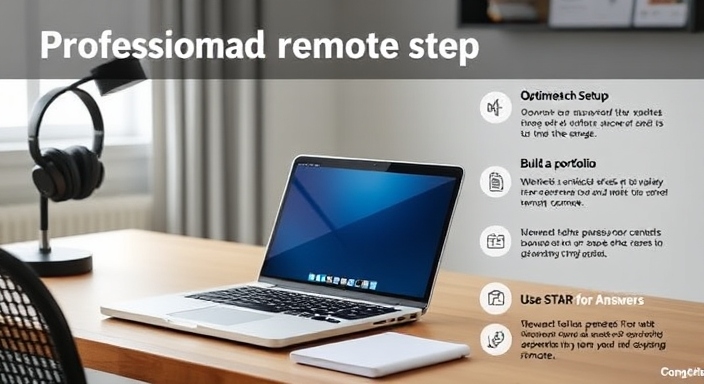
Introduction
Remote job interviews have become the norm in today’s work environment, thanks to the rise of remote-first companies and hybrid work models. Preparing for a virtual interview involves mastering unique skills beyond traditional in-person interviews. From perfecting your technical setup to demonstrating your adaptability, excelling in a remote job interview requires tailored strategies.
In this guide, we’ll explore actionable tips, real-world examples, and best practices to help you succeed. Whether you’re a seasoned professional or applying for your first remote role, these insights will ensure you’re interview-ready.
Setting the Stage: Preparing for a Remote Job Interview
1. Optimize Your Technical Setup
Your technical setup plays a crucial role in leaving a positive impression:
- Hardware: Ensure your computer, camera, and microphone are in good working condition.
- Software: Familiarize yourself with the video conferencing platform (e.g., Zoom, Microsoft Teams, Google Meet).
- Connectivity: Test your internet connection and have a backup plan (like a mobile hotspot).
Example: During a technical interview, a developer’s webcam malfunctioned. By having a backup camera and a clear communication strategy, they smoothly transitioned without delaying the session.
2. Create a Professional Environment
A distraction-free environment shows your commitment to the interview:
- Use a neutral or professional virtual background.
- Ensure proper lighting and minimal noise.
- Inform family or housemates about the interview time.
Pro Tip: Tools like Krisp can reduce background noise, enhancing audio quality during the call.
Mastering the Art of Communication
1. Polished Verbal and Non-Verbal Communication
Remote interviews rely heavily on clear and concise communication:
- Speak confidently and pause to let the interviewer respond.
- Maintain eye contact by looking at the camera, not the screen.
- Use hand gestures naturally to convey enthusiasm.
2. Active Listening
Demonstrate your engagement by:
- Nodding to show understanding.
- Summarizing or paraphrasing key points.
- Asking insightful questions.
Example: During a UX designer’s interview, they actively summarized the interviewer’s design challenges, showcasing their analytical skills.
Showcasing Your Skills and Experience
1. Prepare a Digital Portfolio
A well-organized portfolio can make a lasting impression:
- Include case studies, projects, or code repositories.
- Highlight metrics that show your impact (e.g., “Reduced loading time by 40%”).
- Use tools like Notion or GitHub to present your work effectively.
2. Rehearse Role-Specific Scenarios
Many remote roles include practical tasks or hypothetical scenarios:
- Practice common scenarios in your field (e.g., debugging code for developers or resolving customer complaints for support roles).
- Use tools like Miro for collaborative problem-solving.
Real-Life Insight: A product manager used a live demo on Figma to showcase their roadmap strategy during the interview, impressing the panel with their preparedness.
Navigating Cultural Fit and Soft Skills
1. Adaptability and Time Management
Employers value candidates who can work autonomously:
- Share examples of managing remote workflows or time zones.
- Highlight your ability to prioritize and meet deadlines.
2. Team Collaboration in Virtual Environments
Discuss your experience with tools like Slack, Trello, or Jira:
- Share how you’ve maintained effective communication and contributed to team goals in a remote setup.
Example: A marketing specialist highlighted their success in coordinating a global campaign using Asana and weekly check-ins.
Real-Time Troubleshooting During Interviews
1. Handling Technical Glitches
If issues arise:
- Stay calm and communicate the problem.
- Offer solutions, such as rescheduling or switching platforms.
Pro Tip: Keep a tech checklist handy to avoid common pitfalls.
2. Answering Unanticipated Questions
Employers might test your problem-solving skills:
- Use the STAR method (Situation, Task, Action, Result) to structure your responses.
Example: A software engineer was asked to debug a code snippet live. By calmly explaining their thought process, they turned a challenging situation into an opportunity to showcase their skills.
Conclusion
Excelling in a remote job interview requires more than technical expertise; it demands adaptability, effective communication, and a proactive approach to problem-solving. By mastering these strategies, you’ll position yourself as a strong candidate ready to thrive in a remote role.
Call-to-Action: Ready to elevate your remote career? Start networking on platforms like LinkedIn, join professional groups, and refine your virtual interview skills. For more insights, check out our in-depth guides and resources!